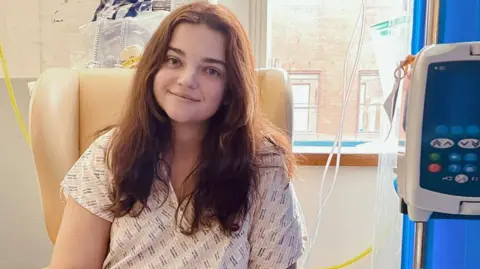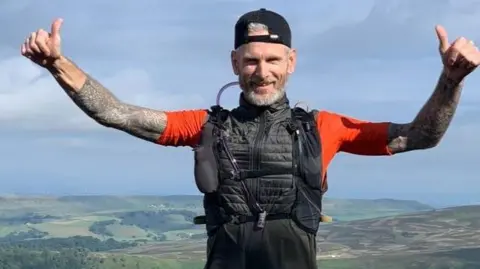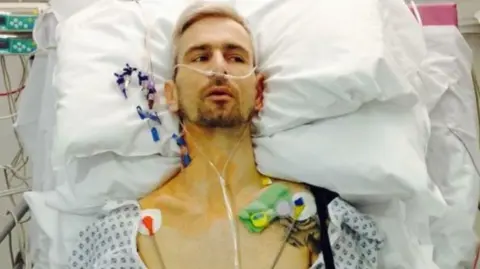'I feel judged when I use my Blue Badge'
 Amy White
Amy WhiteAmy White says she cannot remember a time when she was not struggling with severe pain.
The 31-year-old psychotherapist was diagnosed with Crohn's disease when she was 18.
As well as coping with the chronic condition and its associated health challenges every day, Amy says she often feels judged by strangers.
"I have had lots of people looking at me funny because I'm using a Blue Badge," says Amy, from Ramsbottom in Greater Manchester.
"They probably think 'She looks fine - what does she need that for?' but I have it because I'm in a lot of pain or I need urgent access to the toilet."
'Really lonely'
Amy, who also has arthritis and uveitis - a rare condition that causes inflammation inside part of the eye - is sharing her experiences as part of a six-part BBC North West Tonight series about invisible disabilities and illnesses.
She wants to help others living with conditions which are not immediately obvious.
"I don't really remember not living in pain," explains Amy.
"It's definitely difficult, but I think because I've had it from being so young, this is my 'normal'.
"I think it can feel really lonely.
"I've lost a lot of friends because people don't always understand that I can't do something.
 Amy White
Amy WhiteCrohn's disease is a long-term condition in which part of the gut becomes inflamed.
There is currently no cure.
Amy describes the ongoing impact it has on her life.
"I'm in severe pain," she says. "I'm often bent over, crying, nearly fainting when I'm on the toilet. It's exhausting."
She says having to disclose her condition to employers "can feel hard - it often feels quite embarrassing even though it shouldn't be an embarrassing thing to talk about".
 Danny Warren
Danny WarrenFellow Crohn's disease patient Danny Warren, from Stockport, has spent the majority of the last six months in hospital.
He says it was "touch and go" as to whether he would survive.
Danny, a 43-year-old interior designer, was diagnosed with Crohn's when he was 15, having struggled with its symptoms from the age of eight.
"Some days I physically can't get out of bed," says Danny, who has so far needed nine operations.
"You feel like you lose your identity and it's almost like Crohn's takes over.
"I've currently got a stoma as a result of my last surgery. That's one of the things I struggle with the most in fairness.
"You go on Instagram and you see people with stomas and them saying 'It's changed my life, I'm not in any pain anymore' and they have names for [their bag].
"It makes me really happy that they're in that position but I'd genuinely prefer to be in pain every day and not have it.
"I do really struggle with it. I don't want it, don't like it.
"I can't wait to have more surgery and hopefully get rid of it."
 Danny Warren
Danny WarrenDanny says he has faced similar situations to Amy.
"You will always get funny looks [when using the disabled toilet]," he explains.
"Recently, we were in the Trafford Centre and, as I was coming out, there was a chap with a lady who was in a wheelchair.
"As I walked out the bathroom, I held the door for the gentleman so he could obviously get his wife or partner or whoever it was through and he just turned around and said 'There is a normal toilet you can use, you know'."
Why are Amy and Danny sharing their stories and experiences?
Neither wants sympathy. Rather, both want to raise awareness of Crohn's disease and other invisible illnesses and disabilities.
Amy and Danny's experiences feature in a special six-part BBC North West Tonight series about invisible disabilities and conditions.
You can watch it on BBC One in the Northwest of England and the Isle of Man from 18:30 BST on Thursday 3 July. It will also be available on the BBC iPlayer.
Listen to the best of BBC Radio Manchester on Sounds and follow BBC Manchester on Facebook, X, and Instagram. You can also send story ideas via Whatsapp to 0808 100 2230.
